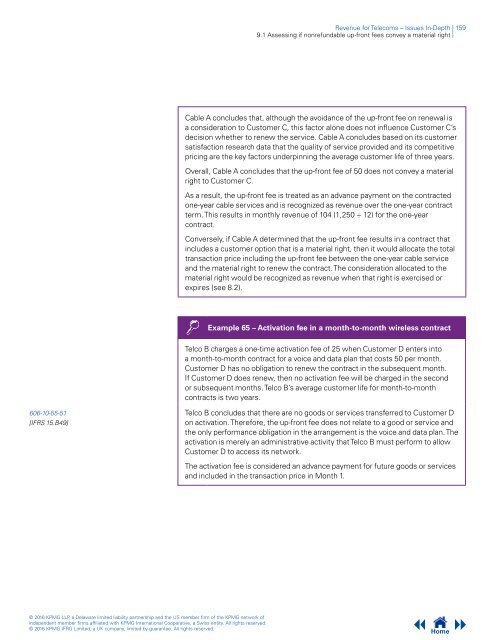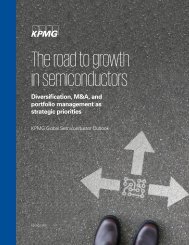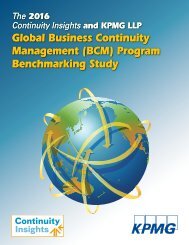Revenue for Telecoms
2cdncba
2cdncba
You also want an ePaper? Increase the reach of your titles
YUMPU automatically turns print PDFs into web optimized ePapers that Google loves.
<strong>Revenue</strong> <strong>for</strong> <strong>Telecoms</strong> – Issues In-Depth | 159<br />
9.1 Assessing if nonrefundable up-front fees convey a material right |<br />
Cable A concludes that, although the avoidance of the up-front fee on renewal is<br />
a consideration to Customer C, this factor alone does not influence Customer C’s<br />
decision whether to renew the service. Cable A concludes based on its customer<br />
satisfaction research data that the quality of service provided and its competitive<br />
pricing are the key factors underpinning the average customer life of three years.<br />
Overall, Cable A concludes that the up-front fee of 50 does not convey a material<br />
right to Customer C.<br />
As a result, the up-front fee is treated as an advance payment on the contracted<br />
one-year cable services and is recognized as revenue over the one-year contract<br />
term. This results in monthly revenue of 104 (1,250 ÷ 12) <strong>for</strong> the one-year<br />
contract.<br />
Conversely, if Cable A determined that the up-front fee results in a contract that<br />
includes a customer option that is a material right, then it would allocate the total<br />
transaction price including the up-front fee between the one-year cable service<br />
and the material right to renew the contract. The consideration allocated to the<br />
material right would be recognized as revenue when that right is exercised or<br />
expires (see 8.2).<br />
Example 65 – Activation fee in a month-to-month wireless contract<br />
Telco B charges a one-time activation fee of 25 when Customer D enters into<br />
a month-to-month contract <strong>for</strong> a voice and data plan that costs 50 per month.<br />
Customer D has no obligation to renew the contract in the subsequent month.<br />
If Customer D does renew, then no activation fee will be charged in the second<br />
or subsequent months. Telco B’s average customer life <strong>for</strong> month-to-month<br />
contracts is two years.<br />
606-10-55-51<br />
[IFRS 15.B49]<br />
Telco B concludes that there are no goods or services transferred to Customer D<br />
on activation. There<strong>for</strong>e, the up-front fee does not relate to a good or service and<br />
the only per<strong>for</strong>mance obligation in the arrangement is the voice and data plan. The<br />
activation is merely an administrative activity that Telco B must per<strong>for</strong>m to allow<br />
Customer D to access its network.<br />
The activation fee is considered an advance payment <strong>for</strong> future goods or services<br />
and included in the transaction price in Month 1.<br />
© 2016 KPMG LLP, a Delaware limited liability partnership and the US member firm of the KPMG network of<br />
independent member firms affiliated with KPMG International Cooperative, a Swiss entity. All rights reserved.<br />
© 2016 KPMG IFRG Limited, a UK company, limited by guarantee. All rights reserved.<br />
Home







